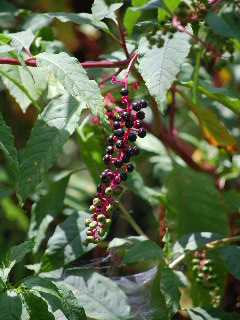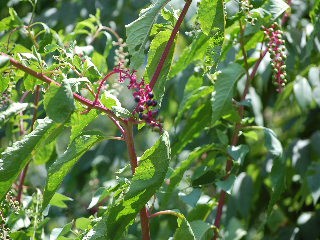
Pity the poor polk plant! Who could blame it if it suffers from a bit of an identity crisis?
It’s famous of course, as in the song “Polk Salad Annie” which was written and recorded in the 1960’s by Tony Joe White and also recorded by Elvis Presley and others.
And it’s an edible plant, too, as the song informs us and as attested to by generations of Southern rural folks who have consumed it as part of a “free for the gathering” wild green.
But then, another segment of the population tells us not to eat it because it’s poison! What a weird and crooked road on the way to fame for the polk plant!
Polk—actually pokeweed (Phytolacca Americana)—is a wild, naturally growing weed of the Southern United States. The tender young leaves of the polk plant are picked in the early summer before the plant becomes very large.
These tender young leaves are then boiled in water 2 or 3 times with the water being discarded each time. This is said to remove the toxins from the leaves, thus making them palatable for human consumption.
After the leaves are boiled repeatedly, they are then often stir-fried in an iron skillet with bacon fat added for seasoning. The texture and taste of the cooked pokeweed leaves is similar to that of spinach or collard greens, and the vitamin and mineral content is similar to these other greens as well.
Leaves of the pokeweed should not be consumed after the berries have formed. It is believed that the berries, roots, seeds, stems, and mature larger leaves of the plant contain too much toxicity to be safe for human consumption.
Birds love to feast on the mature berries, which turn from a bright green color to a dark shade of purple as they ripen.

It is said that the birds are unaffected by the toxins of the pokeweed berries because the seeds contained in the berries are so hard that they do not break down as they pass through the digestive tracts of the birds, and are thus expelled without harming the wildlife.
What does happen to that yucky dark purple pulp as it passes on through the bodies and out the posterior portion of our flying friends is that it often ends up as a disgusting “splat” on the windshields or bodies of automobiles!
And, what a brilliant mess it makes if your car is painted white or some other light color and the goop stays on there long enough to dry before you discover it and are able to wash it off!
Such is the fate of polk—survival fare for the poor folks and the scourge of the automobile fancier. I told you its road to fame and notoriety was a weird one!
 Pity the poor polk plant! Who could blame it if it suffers from a bit of an identity crisis?
Pity the poor polk plant! Who could blame it if it suffers from a bit of an identity crisis?
 It is said that the birds are unaffected by the toxins of the pokeweed berries because the seeds contained in the berries are so hard that they do not break down as they pass through the digestive tracts of the birds, and are thus expelled without harming the wildlife.
It is said that the birds are unaffected by the toxins of the pokeweed berries because the seeds contained in the berries are so hard that they do not break down as they pass through the digestive tracts of the birds, and are thus expelled without harming the wildlife.